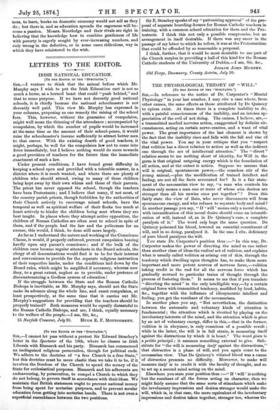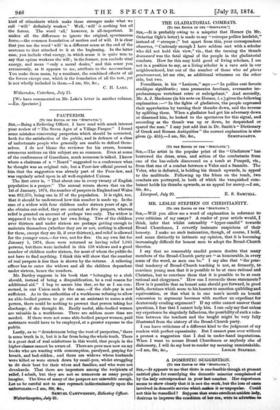THE PHYSIOLOGICAL THEORY OF " WILL."
(TO THE EDITOR OF THE "SPECTATOR."] SIR,—In reference to the notice of Dr. Carpenter's "Mental Physiology" in your last number, I may cite a case where, from other causes, the same effects as those attributed by De Quincey to opium exist. At times there is a complete inability to do, with a painful consciousness of the inability, and an intense ap- preciation of the evil of not doing. The causes, I believe, are,— a transmitted morbid nervous action, exaggerated by definite cir- cumstances, acting on certain nerve-centres, and a want of vital power. The great importance of the last element is shown by the fact that the inability rises and falls with the fall and rise of the vital power. You say in your critique that you " suspect that volition has a direct relation to action as well as the indirect one through the act of intellectual attention." The " direct " relation seems to me nothing short of identity, for Will in the germ is that original outgoing energy which is the foundation of all action, and at the outset is action. Suppose we assume that will is original, spontaneous power,—the ceaseless stir of the young animal,—plus the modification of trained intellect and feeling, are not all the facts accounted for? Is it a fair state- ment of the necessarian view to say, "a man who controls his desires only means a man one or more of whose wise desires are stronger than all his unwise ones put together" ? Does this fairly state the view of Bain, who never disconnects will from spontaneous energy, and who refuses to separate body and mind? In another passage you say, "If ' will' means only a moral desire, with intensification of this moral desire should come an intensifi- cation of will, instead of, as in De Quincey's case, a complete paralysis of it." The word only begs the same question. De Quincey poisoned his blood, lowered an essential constituent of will, and in so doing, paralysed it. In the case I cite, deficiency of pure blood paralyses the will.
You state Dr. Carpenter's position thus :—" In this way, Dr. Carpenter makes the power of directing the mind to one rather than another class of ideas the radical act of volition, and explains what is usually called volition as arising out of this, through the tendency which dwelling upon thoughts has, to make them more important and more potent sources of nervous force,—volition taking credit in the end for all the nervous force which has gradually accrued to particular trains of thought through the process of fostering them." It seems to me that if you translate " directing the mind" in the only intelligible way,—by a certain original force with transmitted tendency, modified by food, habits, &c., together with the influence of idiosyncratic intellect and feeling, you get the resultant of the necessarians.
In another place you say, "But nevertheless, the distinction between the automatic and voluntary kinds of attention is fundamental ; the attention which is rivetted by playing on the involuntary interests of the mind, and the attention which is given by an act of voluntary energy, differ in this,—that in the former, volition is in abeyance, is only conscious of a possible revolt ; while in the latter, the will is in full strain, is measuring itself against the distractions by which it is beset." The word given is a petitio principii ; it assumes something external to give. Sub- stitute for " the will is measuring itself against the distractions," that distraction is a phase of will, and you again come to the necessarian view. That De Quincey's vitiated blood was a cause of distraction presents no difficulty. Moreover, to make will measure itself is to credit it with the faculty of thought, and so to set up a second mind acting on the mind.
Elsewhere you state your position thus :—" If will' is nothing but the resultant of all the forces acting on character, then we might fairly assume that the same sorts of stimulants which make the involuntary impressions and desires stronger would make the will, which is, in that case, the mere equivalent of the involuntary impressions and desires taken together, stronger too, whereas the
kind of stimulants which make these stronger make -what we call will' definitely weaker." Well, will' is nothing but all the forces. The word all,' however, is all-important. It makes all the difference to ignore the original, spontaneous force,—the common foundation of motion and of will. It is clear that you use the word will' in a different sense at the end of the sentence to that attached to it at the beginning. In the latter case, you include vital energy, in which sense it is quite true to say that opium weakens the will ; in the former, you exclude vital energy, and mean " only a moral desire," and this sense you erroneously, as it appears to me, attribute to the necessarians. You make them mean, by a resultant, the combined effects of all the forces except one, which is the foundation of all the rest, yet is not wholly included in them.—I am, Sir, &c.,
[We have commented on Mr. Lake's letter in another column. —En. Spectator.]



































 Previous page
Previous page